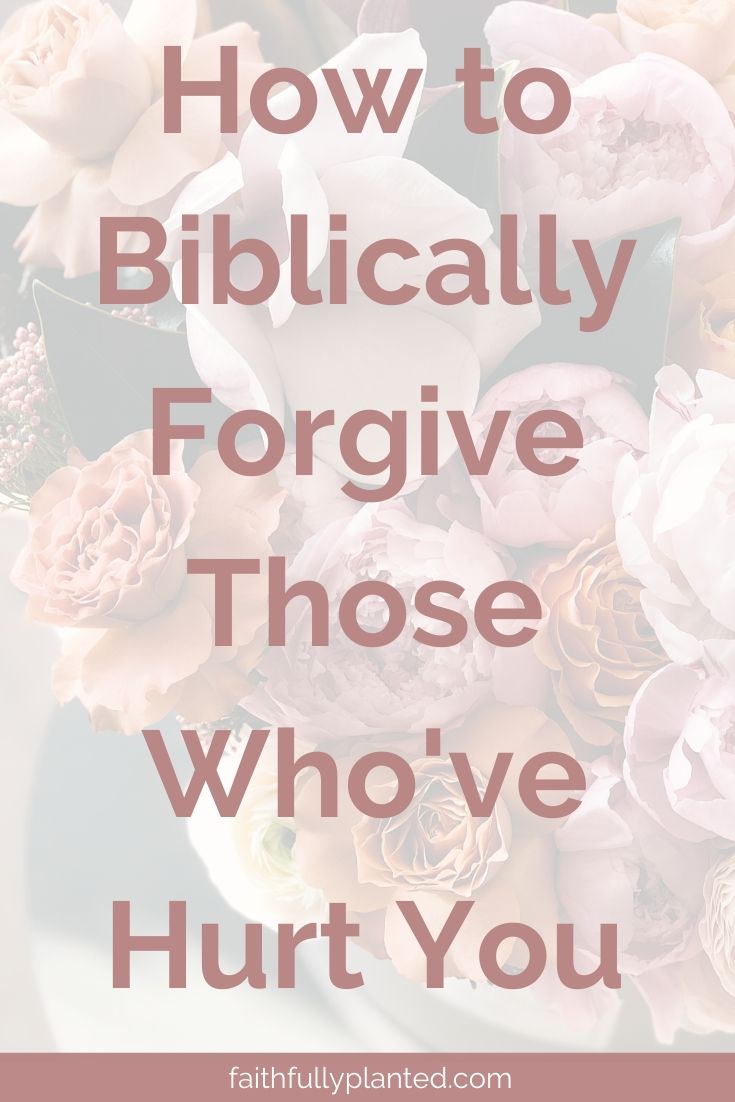
Is it possible to truly forgive others? What does God say about forgiveness?
The answer to the first question is a resounding yes.
Not only do I believe it’s possible and that humans are capable of true forgiveness, according to the Bible, it’s also commanded. It’s required of Christians who have surrendered their hearts and lives to Jesus.
Biblical forgiveness is not just limited to other believers or to people who have apologized or to those who have received “justice” according to the world. It is not limited to those who “deserve” forgiveness. Biblical forgiveness requires us to forgive even the most heinous of offenses, which may be difficult for some of us to hear.
I know it was for me.
If you have been a reader for a while, you’ve likely read my testimony post and know I experienced both physical, emotional and sexual abuse as a child. Both molested, raped and abused, I never believed forgiveness of these men was possible for me. I never believed my heart could forgive the people in my life who hurt me the most.
I carried the weight of these offenses for decades until eventually, I learned what it truly meant to offer the forgiveness the Bible calls us to give to others. Even those who have wronged us.
This doesn’t mean that I don’t struggle with this and that I forgive immediately all the time. But God has shortened the time it takes for me to get to a place of forgiveness and taught me so much about the forgiveness I’ve been given in Jesus.

If you are struggling to forgive someone who has wronged you, you are not alone. This is a difficult issue that I understand all too well.
First, friend, let me say I am so sorry for the hurt you’ve experienced and that pain you have been through. I am so sorry if you have been hurt, cheated, violated, abused, betrayed or made to feel less than because of part of who you are. Nothing in this post is meant to minimize that or dismiss the heartache you’ve experienced.
The purpose of this post is to lovingly show your heart what Biblical forgiveness looks like and to help you step into healing and peace through obedience to this commandment. I began writing this post after someone sent me a DM on Instagram after I posted a story about Biblical forgiveness. She asked how one could possibly forgive someone who had violated her so personally.
This is a pain and a problem I’ve personally dealt with, and I wanted to share that advice with all of you because statistically, I know there are others out there who are struggling to forgive those who have hurt them and violated them or their families or friends.
First, remind your heart that this person is a loved child of God, too.
The first thing I had to deeply wrestle with and accept is the truth that these people who had hurt me so deeply were created by God and are loved by them. Present tense.
They were knit together in their mothers’ wombs, just like you and I were. They had purpose and meaning to their lives and were given the same hope in Jesus that you and I have.
Ultimately, He wants them to be in a relationship with them and for them to repent of their sins and return home. If I truly believe everything that God says about me and what he says about his children in the Bible that I have to believe that he loves that person as much as he loves me.
That was HARD to wrestle with.
This took many many years of counseling and prayer and it is okay to be struggling with it. What you’ve been through is hard and the journey takes as long as it takes.
Trust that God is both a judge and a healer.
The second was to mediate on and accept that God is both a judge and a healer. He promises to right all wrongs and I eventually chose to believe this truth. He would right this wrong for me. Either they would be redeemed by Jesus’ blood like I was and their hearts would change, or they would eventually receive justice.
As I started to seek healing, I realized that through Jesus whatever was taken from me could be restored. Forgiving them was just an outward expression of accepting God’s healing in my life.
They are still a part of my story, but they no longer have any debt to me because I’ve forgiven them and stepped into my own freedom and healing. In order to fully heal, I had to let go of any anger or resentment held toward those who had hurt me.
Ultimately, this comes down to whether you believe God is who He says He is. Do you believe He is a healer? (Psalm 147:2) Do you believe He is a righteous judge who will right all wrongs in this world? (Psalm 9:8)
If I believe God’s Word, then I can trust He will make all wrongs right in His time.
Begin by praying for them and for your heart to change.
Biblical forgiveness is hard and getting to a place of truly forgiving those who have hurt you is a process. Rome wasn’t built in a day and neither will your heart be changed (unless God chooses to miraculously do so.) That can happen too, but largely, it will take time and work and a lot of prayer on our part to surrender this to Jesus and forgive.
Prayer is the most powerful tool we have as Christian women and it is the crucial element to forgiveness that many leave out or neglect. Praying for a forgiving heart will yield opportunities to practice forgiveness. Just like anything else, the more we do it, the easier and more comfortable it will become.
Praying for those who have hurt us is another way we start to walk in forgiveness. The first time you do it, it may be through gritted teeth and that is okay. The Bible tells us to love our enemies and lifting someone and their needs up to the God of the universe is one of the most loving things we can do.
Pray for their salvation; pray for their hearts to be softened and for them to seek repentance for their sins. Pray for your heart to be softened and opened to forgiveness.
God is faithful to hear and answer prayers. (1 John 5:14-15)
Forgiving others is a life-long endeavor.
This process won’t be a one-time event.
Humans are fallible and make mistakes and do things they shouldn’t, likely because they have also been abused and hurt by those they trusted. We won’t get through this life unscathed by humanity. We will be hurt by others, especially if we choose to open our hearts and love and give and serve those who don’t deserve it.
This is a known risk of a life lived for Jesus. (2 Timothy 3:12)
But the Bible is plain and clear about forgiveness. Matthew 18:21-23 says, “Then Peter came to Jesus and asked, “Lord, how many times shall I forgive my brother or sister who sins against me? Up to seven times?” Jesus answered, “I tell you, not seven times, but seventy-seven times.”
As Christians, we are called to continually forgive others. As we are forgiven through Christ, so should we forgive those who hurt us. (Colossians 3:13) This is one of the many ways we look different from the world. Our witness is in our ability to love, forgive, serve and obey God’s commands.
Forgiveness is not an endorsement.
This one is something that causes many Christians to struggle with when it comes to forgiving others. Your forgiveness is not a stamp of approval.
Jesus prayed for forgiveness over the very people who tortured and crucified Him. (Luke 23:34) He was not saying He approved of their actions by doing this.
The world often sends us the message that if we forgive someone, we have condoned what they did. Phrases like, “I could never forgive someone for doing that to me” or “How could you forgive something so awful?” make us feel like to forgive we must be okay with the action we are forgiving.
This is a beautifully crafted lie Satan has spread to keep Christians stuck in pain, resentment, anger, disobedience, and fear. If we can break free of this lie and freely forgive others, we will open the floodgates for healing and peace in our lives.
Forgiveness does not mean there cannot be boundaries.
The last thing I will say about walking out Biblical forgiveness is that choosing to forgive someone does not mean they have to be your best friend. It doesn’t even mean they get to be a part of your life.
Forgiveness is about you and your healing and your obedience. It actually isn’t about who you are forgiving.
Forgiveness is not a golden ticket for them to re-enter your life. Boundaries are often necessary for your safety or for your family’s safety. Boundaries are often needed for you to have the space to heal.
Seek discernment and wisdom from the Lord when it comes to the boundaries you and others may need. Seek His guidance and the wisdom of trusted believers on whether distance or reconciliation is more appropriate.
Have you ever struggled to forgive someone? Do you have a story of forgiving someone who has hurt you? Tell me about it in the comments!




Forgiven my great grandfather for molesting me, forgiving a guy who attempted to rape me,forgave myself hooking up with a married man and a man engaged. And I am forgiving someone pretended be someone I wanted who already has a family. So I am asking the Lord to forgive me also and now I can live with peace that God is with me and He is all i need.